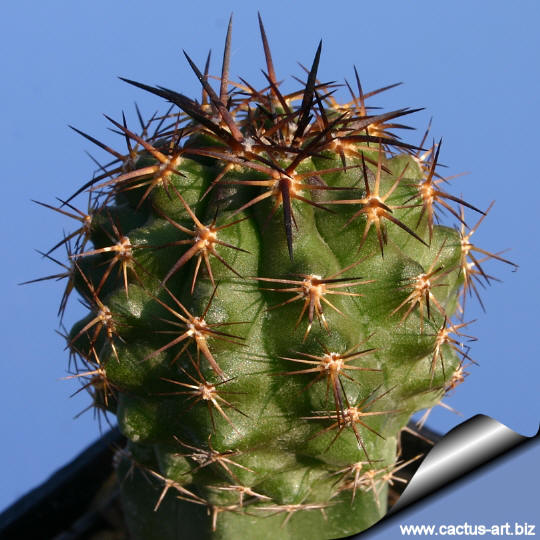|
Family:
Cactaceae
(Cactus
Family)
Copiapoa rubriflora F. Ritter 1963
Accepted
Scientific name:
Copiapoa rupestis F. Ritter
In Taxon 12(1):29 - 1963
These plants have been given an assortment of names involving desertorum,
and rupestris.
Origin: Coastal Chile, Prov. Antofagasta, Dept.
Taltal, near Cifuncho
Ritter reports that the plant is rare in habitat and is associated with
C. rubriflora, which extends inland to the north near
Estación Breas .
Habitat: Rocky and very arid
coastline. The long
tuberous root of this Copiapoa is buried deeply in these soils which are
very poor in organic matter. In the area where this plants grows
there is very little rain but frequent coastal fog, which provides a
significant part of their water needs.
Conservation status:
Listed in
CITES appendix 2.
Synonyms (of Copiapoa taltalensis):
- Copiapoa desertorum F. Ritter 1980
- Copiapoa taltalensis (Werderm.) Looser 1929
- Echinocactus taltalensis Werderm
- Copiapoa rupestris ssp. desertorum
- Copiapoa rubriflora F. Ritter 1963
- Copiapoa olivana F. Ritter 1980
- Copiapoa montana F. Ritter 1960
- Copiapoa hypogaea var. montana (F. Ritter) G. J.
Charles 1960
- Copiapoa hornilloensis F. Ritter 1980
- Copiapoa rarissima F. Ritter 1980
|
|
Description: Clustering
and very spiny plant that forms loose clumps up to 40 cm tall, 90 cm
wide
Stem: Firm, globose to short cylindrical green to 40 cm high,
5-11 cm across with apex densely covered by spines.
Roots: Enlarged turnip-like, more or less elonged not restricted
at the neck.
Ribs: 13-15 stright, 10-12 mm high, somewhat flattened with
raised tubercles;
Areoles: Round, pale brown 7-10 mm across.
Spines: Subulate, mostly slightly recurved, thick, dark brown
becoming grey.
Radial spines: 6-8(-12), 1-2 cm long.
Central spines: 1-3, 2-4 cm long.
Flowers: Scented, saffron/yellow or reddish, 2.5 cm long with
short acuminate petals, ca. 13 mm long, 5-7 mm wide. Stamens approx 15
mm long, pale saffron. Style 17-19 mm long, stigma with about 8 lobes;
Fruit: Green to red-green, 15 mm long, 7 mm wide with 6-12
reddish scales.
Blooming season: Spring and summer.
Seed: 1 mm long, 0.7 mm wide with white, oval hilum. The back of
the seed is keeled.
Note: Taylor (1981) suggests C. rubriflora could be
a variety of C. rupestis. To be considered here would be
C. hornilloensis and C. desertorum.
|
|

Photo of conspecific taxa, varieties,
forms of plants
belonging to the Copiapoa humilis/taltalensis
complex
(This
Taxon has lots of synonyms (like most copiapoas)
with several controversial varieties and subspecies):
Propagation:
Seeds (or offsets if available), Grafting is often
used to speed growth rate and to create a back-up to plants in
collection.
Cultivation: This
extremely slow growing cactus is kept for the beauty of its form and for
its red flowers.
It
must be protected from excessive heat and sun in
summer.
It requires light but regular waterings in summer, but let the soil
mix dry between waterings, Prone to rot if over-watered.
Needs good drainage.
Keep warm and dry in
winter (10°C) to avoid rot. Not highly tolerant of a great deal
of frost. (Frost tolerance 0°C) |